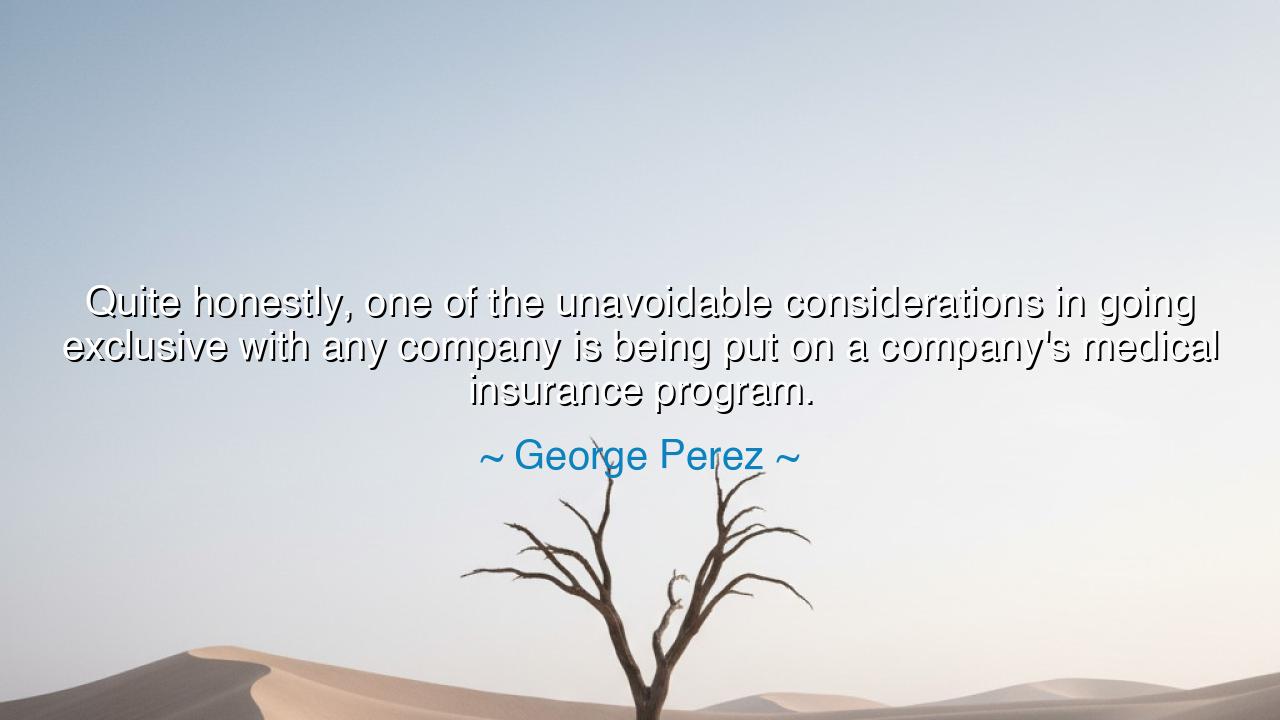
Quite honestly, one of the unavoidable considerations in going
Quite honestly, one of the unavoidable considerations in going exclusive with any company is being put on a company's medical insurance program.






The words of George Pérez, spoken with honesty and humility, reveal a truth both practical and profound: “Quite honestly, one of the unavoidable considerations in going exclusive with any company is being put on a company’s medical insurance program.” Though simple in form, these words carry the weight of life’s quiet realities—the tension between art and survival, between the dream of creation and the demands of the mortal body. They remind us that even the most gifted among us, those who shape worlds with their imagination, remain bound to the human condition. Behind every masterpiece, there is not only inspiration but also the need for security, for health, for care.
In his time, George Pérez was not only a legend among artists but a craftsman of heroes. His hand drew the gods of the comic page—Superman, Wonder Woman, The Avengers, and the Teen Titans—figures who stood beyond pain and sickness. Yet his words pierce the illusion that creators themselves are invincible. The medical insurance he speaks of symbolizes more than a financial benefit; it is the shield of mortality, the acknowledgment that no matter how great our gifts, we too can break, bleed, and fall ill. His statement is both an artist’s confession and a worker’s truth: that passion cannot flourish without stability, and that even the bravest hearts need protection from life’s uncertainties.
This quote was born not from theory, but from experience. The world of freelance creation, particularly in the comic industry where Pérez worked, was often harsh and unpredictable. Artists poured their souls into stories that inspired millions, yet many had no health coverage, no safety net when sickness struck. Pérez, known for his deep integrity and care for his peers, understood that loyalty to a company often came not from greed or fame, but from necessity—from the need to safeguard one’s own health and the well-being of one’s family. Thus, his words carry the quiet wisdom of one who had seen the cost of vulnerability and knew that even the most creative spirit cannot live on passion alone.
There is a story from the Renaissance that mirrors this truth. The great sculptor Michelangelo, though blessed with genius, was plagued by poverty and the burdens of his labor. He carved with his hands until his fingers were crooked and his body broken. When he accepted patronage from the Medicis and later from the Church, some said he had surrendered his freedom. But Michelangelo understood—as Pérez did—that one cannot create art if the body perishes. The patron’s protection was his form of medical insurance, his guarantee that his hands could continue to shape beauty from stone. History remembers his art, but behind it stood the practical wisdom of survival.
So too does Pérez’s reflection speak not only to artists but to all who labor under the sun. It reminds us that security is not a weakness, but a foundation upon which creation and courage are built. To seek stability is not to sell one’s soul, but to protect the vessel that carries it. The medical insurance program he mentions stands as a symbol of society’s covenant with its workers—the promise that those who give their talents to the world will not be abandoned when illness strikes. To honor that covenant is to honor the dignity of human labor itself.
And yet, there is also humility in Pérez’s words—a recognition that choices in life are rarely pure. Every decision carries compromise. To go “exclusive with a company” means to trade some freedom for safety, some independence for structure. But he does not speak with bitterness; he speaks with acceptance. Like the philosopher who knows that freedom without health is illusion, Pérez reminds us that wisdom lies in balance. The true hero is not the one who denies his human needs, but the one who faces them honestly, and still creates despite them.
Thus, my child of reason and art, take this lesson from George Pérez to heart: dream boldly, but build your dreams upon a stable foundation. Do not scorn the practical for the poetic, for both are necessary to sustain the fire within. The body is the chariot of the soul; if it breaks, the spirit cannot journey far. Whether you labor with pen, plow, or hammer, remember that to care for your health is to honor your craft.
In the end, Pérez’s wisdom teaches that even the creators of heroes are human—and that is no shame. For it is in our frailty that our strength is tested, and in our need that compassion is born. Let all who create, and all who work, seek not only glory but also care, not only ambition but also balance. For a world that guards the health of its dreamers ensures that the light of imagination shall never fade.






AAdministratorAdministrator
Welcome, honored guests. Please leave a comment, we will respond soon